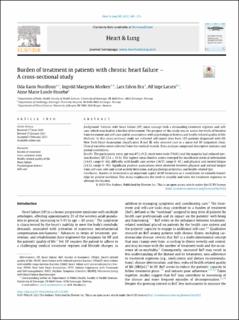Burden of treatment in patients with chronic heart failure – A cross-sectional study
Nordfonn, Oda Karin; Morken, Ingvild Margreta; Bru, Lars Edvin; Larsen, Alf Inge; Husebø, Anne Marie Lunde
Peer reviewed, Journal article
Published version

View/
Date
2021-02Metadata
Show full item recordCollections
Original version
Nordfonn, O.K., Morken, I.M., Bru, L.E. et al. (2021) Burden of treatment in patients with chronic heart failure – A cross-sectional study, Heart & Lung, 50(3), pp. 369-374 10.1016/j.hrtlng.2021.02.003Abstract
Background
Patients with heart failure (HF) must manage both a demanding treatment regimen and self-care, which may lead to a burden of treatment. The purpose of this study was to assess the levels of burdens from treatment and self-care and its associations with psychological distress and health-related quality of life.
Methods
In this cross-sectional study we collected self-report data from 125 patients diagnosed with HF, New York Heart Association classification II and III, who received care in a nurse-led HF outpatient clinic. Clinical variables were collected from the medical records. Data analyses comprised descriptive statistics and partial correlations.
Results
The participants mean age was 67 (±9.2), most were male (74,4%) and the majority had reduced ejection fraction (EF 35.4 ± 10.8). The highest mean burden scores emerged for insufficient medical information (34.65, range 0–86), difficulty with health care service (34.57, range 0–81), and physical and mental fatigue (34.12, range 0–90). Significant positive associations were observed between physical and mental fatigue from self-care, role and social activity limitation, and psychological distress, and health-related QoL.
Conclusion
Burden of treatment is an important aspect of HF treatment as it contributes to valuable knowledge on patient workload. This study emphasizes the need to simplify and tailor the treatment regimens to alleviate the burden.
